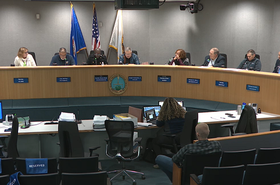When something happens often enough, it’s a pattern. Data centers are being blocked, stymied, and rejected in multiple places. And the reason may have something to do with the industry’s attitudes.
Here are a couple of examples from the last couple of weeks.
After an epic meeting lasting more than 24 hours, Prince William’s planning commission has just recommended that the massive 1GW PW Digital Gateway data center project, proposed by Compass Datacenters and QTS, be rejected.
Meanwhile, over the State border in Maryland, another gigawatt campus, the giant Quantum Loophole park, has struck difficulties. Its first big tenant, Aligned, pulled out after failing to get permits to run 168 diesel generators for backup. A second potential tenant, Rowan Digital Infrastructure, has yet to tell us if it has an alternative approach.
On a smaller scale, in London, Greystoke Land was denied permission to build what it called the West London Technology Park, a 150MW campus on a piece of grassland between a motorway and a business park.
Inability to engage
In all three cases, data center developments faced opposition from environmentalists who didn't want the data centers. And in all three cases, the companies involved were wrong-footed, expressing surprise that they weren’t allowed to go right ahead with their projects.
To many inside the industry, the benefits of data centers are so self-evident, that they don't think they should have to justify them. A lot of times, these people are so out of practice at engaging that they simply don't know how to explain the benefits or understand the objections of others.
So QTS refused to acknowledge there were people outside its offices protesting against the PW Digital Gateway, and it sued landowners who wouldn't cooperate.
In Maryland, Aligned pulled out, warning that it would "cost the state billions of dollars" if the Quantum Loophole project failed. Quantum Loophole itself has yet to say anything directly to us.
In London, a Greystoke director blamed the decision on “Green Belt Theology” saying the green field he had in his sights was "neither use nor ornament" and was being withheld because of simple dogmatism.
In our position, reporting what is happening in the data center industry, we've noticed a disappointing pattern - when things don't go their way, too many data center organizations would prefer the story was not told at all.
Make the case
This is a shame because, in all those cases, the industry has actual arguments to make.
I don't mean the simplistic "if you want the cloud, you have to have data centers."
That argument ignores the fact that the cloud centralizes resources so data centers are less location-specific.
It's blatantly obvious that I can have the cloud, while someone else has the data centers. Any protester with a smartphone picketing a proposed data center site knows that.
If people are going to accept data centers, they have to want the data centers. And that means understanding your neighbors.
The PW Digital Gateway project got off the ground in the first place, Mary Ann Ghadban says, because she wanted schools in Prince William County to be as good as the ones in Loudoun, which are funded by data center taxes.
Maryland's Public Services Commission saw the backup generators at Quantum Loophole as a power plant, objecting to it. Maybe that backup power could be reconfigured somehow to benefit the community.
And Greystoke could certainly explore with its potential neighbors the actual uses of the land it hoped to occupy.
Keep talking
At DCD Connect Virginia this week, a panel on the data center PR issue sat industry spokespeople down with people who have campaigned against data centers in their communities.
We are immensely grateful for the campaigners who came to engage with us on that platform and believe the data center responded with reasoned argument.
You will see more reporting on this issue in future but, for now, what can the industry do? It's obvious that data centers need to reach out to their surrounding communities.
Today's DCD Awards Shortlist includes a category intended to recognize exactly this - the Community Impact Award.
You can have a look and see how the industry has done this year. And, if the industry properly accepts the need to engage, it should be a hotly contested category in the future.





